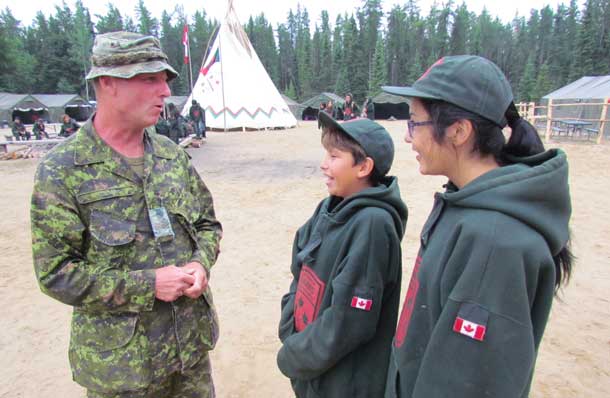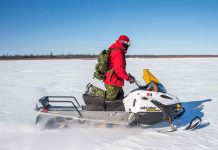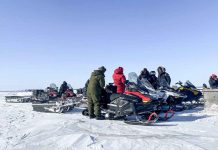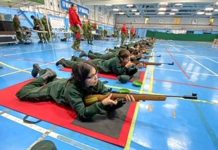
He is an instructor and the Junior Canadian Ranger training co-ordinator for 3rd Canadian Ranger Patrol Group (3CRPG), which has 750 Junior Rangers in 20 remote and isolated First Nation communities across northern Ontario under its command. The Junior Rangers are Cree, Oji-Cree, and Ojibway.
The Junior Rangers are a national program run by the Canadian Army for boys and girls aged 12 to 18 in remote communities across Canada’s North. It emphasizes safety on the land and water and in personal lifestyles.
“That 20 per cent of my time that I spend in the North is the highlight of the job for me, being in the North and with people I like,” he said. “It’s very different from Borden. I see a part of Canada and a way of life that very few Canadians have the privilege of seeing. It takes a bit of adjusting when I am back at Borden and back to the conventional army after being up North for as long as three weeks.”
Most of the time he is by himself when he is in the North, although he occasionally travels with another instructor. Accommodation in the Aboriginal communities is what he can find. Some communities have accommodation for visitors. Sometimes he has to stay with a family. Often, training requires him to be on the land, and then he sleeps in a tent.
In the summer there are mosquitoes and black flies, in the winter there are frigid temperatures.
“The coldest I’ve had was minus 56 degrees without the wind chill factor,” he said. “You learn how to deal with the cold from the people in the communities. They teach you a lot about how to survive on the land. It’s a very different way of life up there.
“Generally, I get a good reception wherever I go. People in the First Nations want to see the Junior Ranger program working in their communities. At first they were a bit leery about it. Now they love it. They can see the value of the program for their youth.”
Unlike the army cadets, he said, Junior Ranger training may involve tracking a moose, which a Junior Ranger will shoot. Canadian Rangers and local elders will then show the Junior Rangers how to skin and butcher the animal.
Sergeant Doherty, a veteran of 34 years in the army and 13 years with 3CRPG, recently spent eight days instructing Junior Rangers at Camp Loon, an advanced training camp for 160 Junior Rangers held annually in the bush north of Geraldton.
“It was a great camp,” he said. “The kids get better every year and it makes you appreciate what the Junior Ranger program means to them and to their communities.”
(Sergeant Peter Moon is the public affairs ranger for 3rd Canadian Ranger Patrol Group at CFB Borden.)






